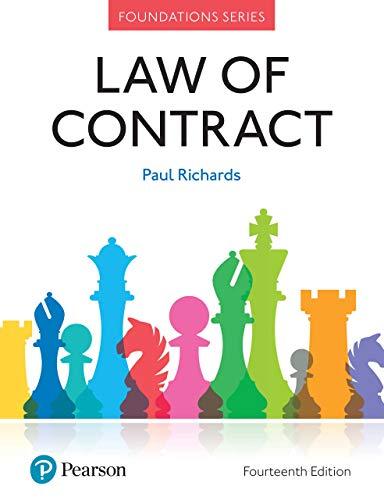Question
For each of the following statements, indicate (with a T or F) whether the statement is True or False. 1._________.The relationship between an employee and
For each of the following statements, indicate (with a "T" or "F") whether the statement is True or False.
1._________.The relationship between an employee and employer is one of a fiduciary nature in which the employee owes a duty of good faith, loyalty, honesty and fair dealing to the employer.
2.__________.A gift, including gifts of love and affection, does not generally constitute valid consideration to support a contract.
3.__________.An unilateral contract is one that is typically made in a general way to an identifiable group of persons and invites an acceptance by the performance of a specified act or acts.
4._________.The doctrines of promissory estoppel and unjust enrichment allow a Court to provide the reasonable value of goods or services where the party who received the goods or services did so in the absence of a legally-binding contract and the interests of justice require such an outcome.
5._________.In general, the common law governs contracts for the sale of services, including professional services, and real estate interests while the Uniform Commercial Code governs merchant contracts for the sale of goods.
6._________.All legal, enforceable contracts for the transfer of interests in real estate are required to be in writing and formally signed by the parties pursuant to the Statute of Frauds.
7._________.Agreements made with minors are generally voidable by the minor and may be disavowed when the minor attains the age of majority, provided the disaffirmance occurs within a reasonable time after attaining the age of majority.
8._________.In general, contracts that give one party the ability to cancel the parties' obligations in his or its sole discretion are illusory and are not enforceable due to a lack of contractual intent.
9._________.At common law, an acceptance that does not accept the terms of an offer exactly as made is deemed at law to be a rejection of the original offer and a counteroffer.
10.__________.A promise not to compete with your employer for a certain term of months or years after you leave its employ is also known as a "restrictive covenant" and is enforceable by the courts in general if it is reasonable in scope.
Step by Step Solution
There are 3 Steps involved in it
Step: 1

Get Instant Access to Expert-Tailored Solutions
See step-by-step solutions with expert insights and AI powered tools for academic success
Step: 2

Step: 3

Ace Your Homework with AI
Get the answers you need in no time with our AI-driven, step-by-step assistance
Get Started


